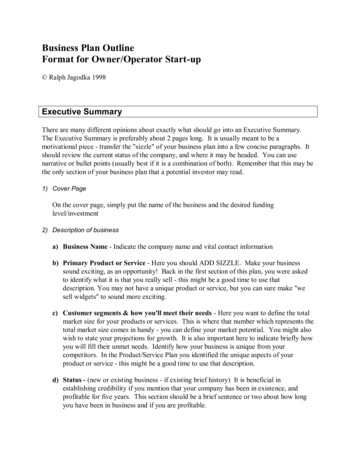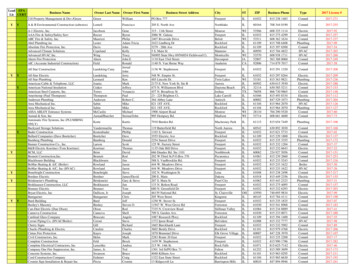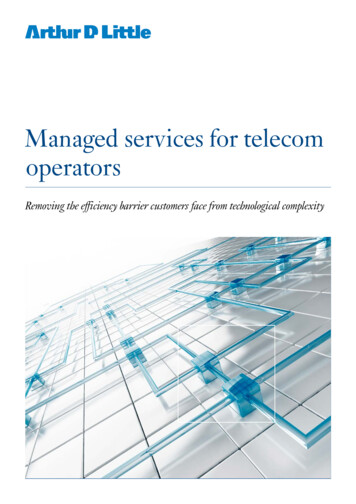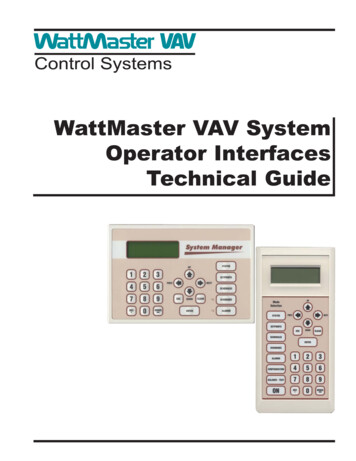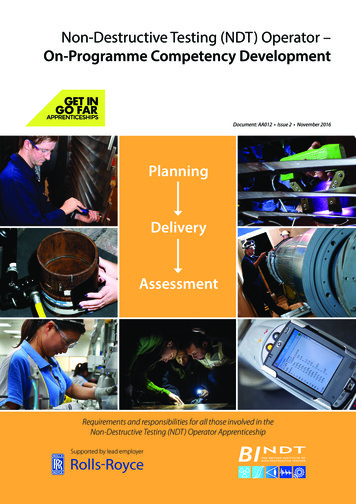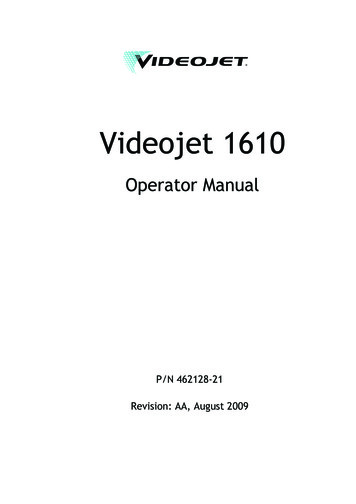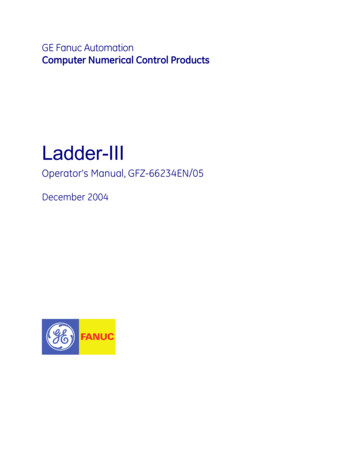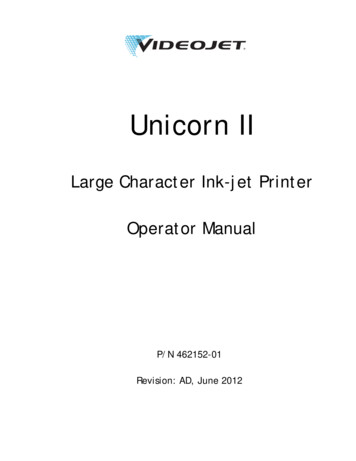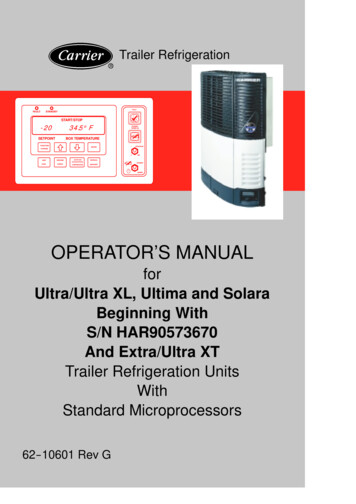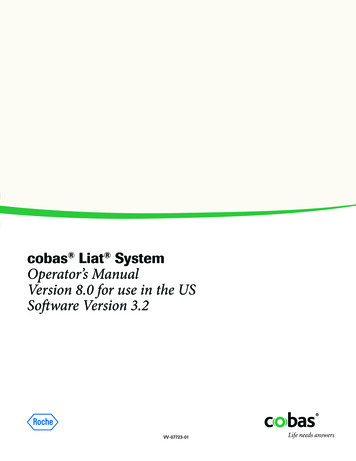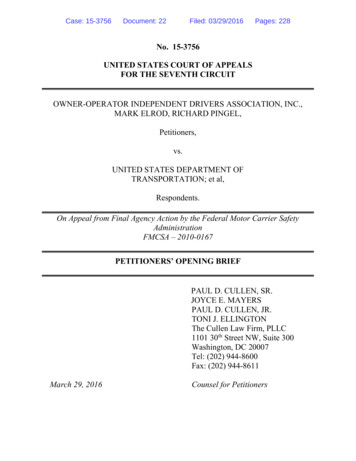
Transcription
Case: 15-3756Document: 22Filed: 03/29/2016Pages: 228No. 15-3756UNITED STATES COURT OF APPEALSFOR THE SEVENTH CIRCUITOWNER-OPERATOR INDEPENDENT DRIVERS ASSOCIATION, INC.,MARK ELROD, RICHARD PINGEL,Petitioners,vs.UNITED STATES DEPARTMENT OFTRANSPORTATION; et al,Respondents.On Appeal from Final Agency Action by the Federal Motor Carrier SafetyAdministrationFMCSA – 2010-0167PETITIONERS’ OPENING BRIEFPAUL D. CULLEN, SR.JOYCE E. MAYERSPAUL D. CULLEN, JR.TONI J. ELLINGTONThe Cullen Law Firm, PLLC1101 30th Street NW, Suite 300Washington, DC 20007Tel: (202) 944-8600Fax: (202) 944-8611March 29, 2016Counsel for Petitioners
Case: 15-3756Document: 22Filed: 03/29/2016Pages: 228TABLE OF CONTENTSCIRCUIT RULE 26.1 - DISCLOSURE STATEMENT.iTABLE OF CONTENTS . iiTABLE OF AUTHORITIES .vGLOSSARY. xiiJURISDICTIONAL STATEMENT .1ISSUES PRESENTED FOR REVIEW .1THE FINAL RULE AT ISSUE HERE.3STATEMENT OF THE CASE .3STANDARD OF REVIEW .7SUMMARY OF THE ARGUMENT .7ARGUMENT .10I. THE FINAL RULE DOES NOT IMPLEMENT THE STATUTORYMANDATE TO RECORD CHANGES IN DUTY STATUSAUTOMATICALLY .10A. FMCSA Admits That the ELD Rule Does Not Meetthe Statutory Mandate for Automatic Recording .10B. The Final Rule Does Not Improve Hours ofService Compliance.14II. THE FINAL RULE FAILS TO ENSURE THAT ELDS ARENOT USED TO HARASS DRIVERS. .23A. There Is No Textual Support For FMCSA’s NarrowInterpretation of Its Duty to Ensure Against Harassment. .23ii
Case: 15-3756Document: 22Filed: 03/29/2016Pages: 228B. Neither Budgetary Concerns Nor AdministrativeConvenience Excuse Failure to Implement aStatutory Mandate. .26C. Procedural Obstacles Imposed Upon Driver Complaints. .28III. THE FINAL RULE PROVIDES NO SUPPORT FOR AFINDING THAT ELDS WILL MATERIALLY REDUCEHOURS OF SERVICE VIOLATIONS AND CRASH RISK. 31A. FMCSA’s Roadside Intervention Model Has No Basis inProveable Fact and Relies Solely on Unsupported Assumptions .31B. HOS Rule Compliance Data Is Stale and Unreliable. .36C. FMCSA Has Not Met Its Legal Burden to Show that theBenefits Outweigh the Costs of Mandated ELD Implementation. .39IV. THE FINAL RULE DOES NOT IMPLEMENT THE STATUTORYMANDATE TO INCLUDE MEASURES TO PROTECTCONFIDENTIALITY AND LIMIT THE USE OF DATA DISCLOSEDTO ENFORCEMENT OFFICERS DURING THE COURSE OFENFORCEMENT ACTIVITY . 45V. THE FINAL RULE VIOLATES DRIVERS’ FOURTHAMENDMENT RIGHT TO BE FREE FROM UNREASONABLESEARCHES AND SEIZURES .47A. The Rule Is A Search.47B. The Rule Is A Seizure .49C. The Rule Does Not Qualify for the Exception for a WarrantlessSearch in a Pervasively Regulated Industry .501.The pervasively regulated industry exception applies only tobusiness premises not persons. .51iii
Case: 15-3756Document: 22Filed: 03/29/2016Pages: 2282.The pervasively regulated industry exception applies only toadministrative searches not searches to support lawenforcement . 533.Equipping trucks with ELDs does not further the regulatoryscheme. .564.The Final Rule does not include regulations that serve as aconstitutionally adequate substitute for a warrant .57VI. PETITIONERS HAVE STANDING TO CHALLENGETHE FINAL RULE .58CONCLUSION .60CERTIFICATE OF COMPLIANCE WITH F.R.A.P. RULE 32(a)(7)CERTIFICATE REGARDING CIRCUIT RULE 30(d)CERTIFICATE OF SERVICESHORT APPENDIXiv
Case: 15-3756Document: 22Filed: 03/29/2016Pages: 228GLOSSARYAPAAdministrative Procedure ActCMVCommercial Motor VehicleELDElectronic Logging DevicesEOBRElectronic On Board RecordersFMCSAFederal Motor Carrier Safety AdministrationFMCSRFederal Motor Carrier Safety RegulationsHOSHours of ServiceMCSAPMotor Carrier Safety Assistance ProgramNPRMNotice of Proposal RulemakingOOIDAOwner-Operator Drivers Association, Inc.RODSRecord of Duty StatusRIARegulatory Impact AnalysisSNPRMSupplemental Notice of Proposed Rulemakingxii
Case: 15-3756Document: 22Filed: 03/29/2016Pages: 228JURISDICTIONAL STATEMENTThe Petitioners seek review of FMCSA’s Final Rule mandating the use ofElectronic Logging Devices promulgated on December 11, 2015, and published at80 Fed. Reg. 78292 (December 16, 2015). Short Appendix (S.App. 1). ThePetition for Review was filed on December 11, 2015. This Court has jurisdictionto review this rule under 28 U.S.C. § 2342(3). S.App. 145.ISSUES PRESENTED FOR REVIEW1. 49 U.S.C. § 31137(a) provides that “the Secretary of Transportation shallprescribe regulations requiring a commercial motor vehicle be equipped withan electronic logging device to improve compliance by an operator with hours ofservices regulations .” Section 31137(f)(1)(A) defines an electronic loggingdevice as one that “is capable of recording of driver’s hours of service and dutystatus accurately and automatically .” Is the Final Rule arbitrary and capriciousbecause it does not mandate devices capable of recording a driver’s hours ofservice and duty status automatically?2. 49 U.S.C. § 31137(e)(2) and (3) provide that the Secretary “shall instituteappropriate measures” to preserve the confidentiality and use of personal datacontained in an electronic logging device and disclosed to law enforcementofficials during actions taken to enforce safety regulations. Is the Final Orderarbitrary and capricious because the Secretary undertook no appropriate measures1
Case: 15-3756Document: 22Filed: 03/29/2016Pages: 228to secure the confidentiality of and to restrict the use of personal data by eitherstate or federal enforcement officials?3. The Secretary has a statutory obligation under 49 U.S.C. §§31136(c)(2)(A) and 31502(d) to consider the costs and benefits of a regulation.Because ELDs do not automatically record a driver’s changes in duty status, theyprovide no advantage over paper log books which also require drivers to enterchanges in duty status manually.a. Does the inability of ELDs to improve the accuracy of driver Recordsof Duty Status by operating automatically preclude any finding thatcosts under the Final Rule are justified when no benefits are obtained?b. FMCSA’s Regulatory Impact Analysis failed to test the stated purposeof the regulation—to increase compliance with the hours of servicerules. Does this failure preclude any determination that FMCSA’scost benefit analysis was the product of reasoned decision making?4. The pervasively regulated industry exception to the Fourth Amendment’swarrant requirement has been limited exclusively to the search of businesspremises pursuant to administrative inspections. Does the Final Rule violate theFourth Amendment rights of drivers by authorizing the warrantless search ofdrivers for law enforcement purposes?2
Case: 15-3756Document: 22Filed: 03/29/2016Pages: 228THE FINAL RULE AT ISSUE HEREPetitioners challenge a Final Rule by the Federal Motor Carrier SafetyAdministration (FMCSA) mandating the use of electronic logging devices (ELDs)to record the location and activities of truck drivers who are required under federalrules to keep a record of their duty status (RODS) while operating commercialmotor vehicles in interstate commerce. S.App. 1.STATEMENT OF THE CASEIn 2011 this Court struck down a previous effort by the FMCSA to mandatethe use of electronic monitoring devices in commercial motor vehicles (CMVs).This Court found that FMCSA’s final rule did not address the statutoryrequirement found in 49 U.S.C. § 31137(a) (2011)(S. App. 129) that its “regulationshall ensure that the devices are not used to harass vehicle operators.” OOIDA v.FMCSA, 656 F.3d 580, 582 (7th Cir. 2011)(“OOIDA I”). Subsequently, Congressamended Section 31137 by directing the Secretary of Transportation to prescriberegulations “(1) requiring [that] a commercial motor vehicle involved in interstatecommerce be equipped with an electronic logging device to improve complianceby an operator of a vehicle with hours of service regulations prescribed by theSecretary; and (2) ensuring that an electronic logging device is not used to harass avehicle operator.” 49 U.S.C. § 31137(a)(1), (2) (2014)(S.App. 130). The amendedstatute defines the term “electronic logging device” to mean a device that is3
Case: 15-3756Document: 22Filed: 03/29/2016Pages: 228“capable of recording a driver’s hours of service and duty status, accurately andautomatically .” Section 31137(f)(1)(A). S.App. 132.Sections § 31137(e)(2) and (3) impose upon the Secretary the duty toinstitute appropriate measures to address how enforcement officers deal withinformation acquired by them from ELDs during enforcement actions. S.App. 132.Additionally, FMCSA is required to consider costs and benefits before prescribingsafety regulations. 49 U.S.C. §§ 31136(c)(2), 31502(d). S.App. 135, 127.1. PartiesPetitioners Mark Elrod and Richard Pingel are professional owner-operatortruck drivers who operate CMVs in interstate commerce. Mr. Elrod resides in theState of Indiana, and Mr. Pingel resides in the State of Wisconsin. The OwnerOperator Independent Drivers Association, Inc. (OOIDA), is a not-for-profitcorporation incorporated in 1973 under the laws of the State of Missouri, with itsprincipal place of business in Grain Valley, Missouri. OOIDA is the largestinternational trade association representing the interests of independent owneroperators, small-business motor carriers, and professional drivers. Theapproximately 157,000 members of OOIDA are professional drivers and smallbusiness men and women located in all 50 states and Canada who collectively ownand operate more than 240,000 individual heavy-duty trucks. OOIDA, RichardPingel and Mark Elrod each filed written comments with FMCSA in connection4
Case: 15-3756Document: 22Filed: 03/29/2016Pages: 228with its consideration of the Final Rule challenged here. Sep.App. 173, 175, 227.Petitioners Elrod and Pingel are members of OOIDA.FMCSA is an agency within the U.S. Department of Transportation and hasjurisdiction over a variety of activities of motor carriers and their drivers includingactivities related to the safe operation and maintenance of equipment (trucks) usedto haul freight in interstate commerce.2. General Regulatory BackgroundThe FMCSA has addressed the problem of driver fatigue by implementinghours of service (HOS) regulations. 49 C.F.R., Part 395. These regulationsestablish several different types of duty statuses that must be accounted forincluding on-duty driving, on-duty not driving, off-duty, personal conveyance, andsleeper berth time. 49 C.F.R. § 395.8(b).In order to ensure compliance with the HOS regulations, drivers are requiredto maintain an accurate and current RODS (49 C.F.R. § 395.8), which is anaccounting of when, and for how long, the driver: 1) drove the truck (on-dutydriving); 2) performed work other than driving (on-duty not-driving); and 3) didnot perform any work (off-duty and sleeper-berth). 49 C.F.R. § 395.8.Historically, paper log books have been used to document a driver’s time spent ineach duty status category. Paper log books are filled out and signed by the driver.5
Case: 15-3756Document: 22Filed: 03/29/2016Pages: 228A violation of the HOS regulations (including log book violations) may result in adriver being placed out-of-service. 49 C.F.R. § 395.13.Technological advances have resulted in the development of devices knownas ELDs that provide different levels of automation in the electronic maintenanceof a driver’s RODS. The ELD mandated in the Final Rule automatically keepstrack only of how long someone drives a truck and where they are locatedthroughout the day. In order for an ELD to record the hours a driver spent on-dutynot driving and off-duty, the driver is required to make manual entries into theELD. FMCSA acknowledges this limitation of the final ELD rule. 80 Fed. Reg. at78368, col. 1, S.App. 78. Even though the mandated ELD can automaticallyrecord driving time, it will not maintain an accurate record of duty status unless thedriver has manually entered accurate changes in duty status information into theELD. ELDs therefore provide no advantage over paper log books in keeping anaccurate record of a driver’s compliance with the HOS rules.FMCSA estimates that the Final Rule would subject 3.51 million drivers tothe requirement of using ELDs. 2015 RIA, Sep.App. 382. The Final Rule at issuehere is the culmination of several earlier rulemaking proceedings beginning in1996 in which the potential use of electronic recording devices was raised and/orconsidered. See James Johnston Declaration. S.App. 149.6
Case: 15-3756Document: 22Filed: 03/29/2016Pages: 228STANDARD OF REVIEWThe Court reviews a final rule under the Administrative Procedure Act(APA) de novo to determine whether it is arbitrary or capricious, an abuse ofdiscretion, or otherwise not in accordance with law, contrary to a constitutionalright, power, privilege or immunity, in excess of statutory jurisdiction, authority orlimitations or short of statutory rights, or without observance of procedure requiredby law. 5 U.S.C. § 706(2)(A) – (D). An agency’s interpretation or application of astatute is a question of law reviewed de novo. Texas Eastern Products PipelineCo. v. OSHA, 827 F.2d 46, 47 (7th Cir. 1987).SUMMARY OF THE ARGUMENTThe controlling statute mandates that the Secretary “shall prescriberegulations” requiring that certain commercial motor vehicles be equipped with an“electronic logging device” to improve driver compliance with federal HOSregulations. An electronic logging device is defined in the statute to mean a devicethat is “capable of recording a driver’s hours of service and duty status accuratelyand automatically .” 49 U.S.C. §§ 31137(a)(1), (f)(1)(A). The Secretary admitsthat the ELD specified in the Final Rule does not conform to the statutorydefinition because it is incapable of automatically recording a driver’s hours ofservice and changes in duty status. S.App. 78. This failure to implement the7
Case: 15-3756Document: 22Filed: 03/29/2016Pages: 228statutory mandate defies a statutory limitation on FMCSA’s authority and rendersthe Final Rule arbitrary and capricious. OOIDA I, 656 F.3d at 587.The purpose of Section 31137(a)(1) is to improve driver compliance withHOS regulations. Because the ELDs prescribed by the Final Rule cannot recordnon-driving time automatically, there is virtually no chance that the goal ofincreased compliance with HOS rules can be achieved. The great bulk of HOSviolations found today result from inaccurate driver entry of changes in duty status.Manual entry of inaccurate data into ELDs provides no improvement over themanual entry of such data into paper log books. Petitioners filed comments toFMCSA showing how ELDs easily mask HOS violations based upon incorrectmanual entries of changes in duty status. Sep.App. 187. FMCSA failed to dealwith this analysis relying on nothing but wishful thinking to support its assertionthat HOS compliance would improve. There are no discernible benefits availableto offset the substantial intrusion of driver privacy interests discussed below.Dimeo v. Griffin, 943 F.2d 679, 681 (7th Cir. 1991). FMCSA’s cost benefitanalysis fares no better. No analysis reflecting performance of existing ELD usewas undertaken. FMCSA’s cost benefit analysis thus failed to test the statutorypurpose of the regulation— to increase compliance with the HOS rules.As to drivers’ constitutional privacy interests, FMCSA asserts that theproposed ELD recording of a driver’s activities and whereabouts each 24 hours is8
Case: 15-3756Document: 22Filed: 03/29/2016Pages: 228not a search or seizure. If it were, FMCSA relies exclusively on the pervasivelyregulated industry exception to the Fourth Amendment’s warrant requirement.New York v. Burger, 482 U.S. 691 (1987). This exception is not available here forseveral reasons:1. This exception applies only to the inspection of business premises, notpersons.2. This exception applies only to administrative inspections. Section 31137mandates the use of ELDs directly for law enforcement purposes.3. Mandating the use of ELDs does not further the regulatory schemebecause it provides no improvement over the use of paper log books.4. The Final Rule does not include regulations that serve as aconstitutionally adequate substitute for a warrant.The Secretary’s failure to institute appropriate measures to ensure that lawenforcement officers in the field preserve confidentiality and limit the use of ELDdata obtained from drivers as required by Section 31137(e)(2) and (3) fails toimplement a statutory mandate, also rendering the Final Rule arbitrary andcapricious.Section 31137(a)(2) requires that the Secretary shall prescribe regulationsensuring than an ELD is not used to harass a vehicle operator. After beingrebuffed by this Court for completely ignoring this provision in OOIDA I, the9
Case: 15-3756Document: 22Filed: 03/29/2016Pages: 228Secretary now imposes a miserly interpretation of harassment, robbing thisprovision of any value. Further, the Final Rule injects a poison pill into theprocedural framework that discourages drivers from seeking the agency’s help toaddress harassment. At the same time FMCSA washes its hands of any directresponsibility for ensuring that ELDs are not used to harass drivers. The FinalRule fails again to implement the statutory mandate on harassment.ARGUMENTI.THE FINAL RULE DOES NOT IMPLEMENT THE STATUTORYMANDATE TO RECORD CHANGES IN DUTY STATUSAUTOMATICALLYA. FMCSA Admits That The ELD Rule Does Not Meet The StatutoryMandate for Automatic RecordingThe Secretary is directed by statute to require that commercial motorvehicles operated by drivers subject to HOS regulations be equipped with anelectronic logging device that is capable of recording a driver’s hours of serviceand duty status accurately and automatically ” 49 U.S.C. § 31137(f)(1)(A)(emphasis added). The SNPRM did not propose a rule that would satisfy thisstatutory mandate. SNPRM, Sep.App. 127, 139. OOIDA filed comments withFMCSA objecting extensively to the rule as proposed. Sep.App. 181-184.The definition of an ELD in the Final Rule bears no relationship to thedefinition imposed b
ELD. FMCSA acknowledges this limitation of the final ELD rule. 80 Fed. Reg. at 78368, col. 1, S.App. 78. Even though the mandated ELD can automatically record driving time, it will not maintain an accurate record of duty status unl
